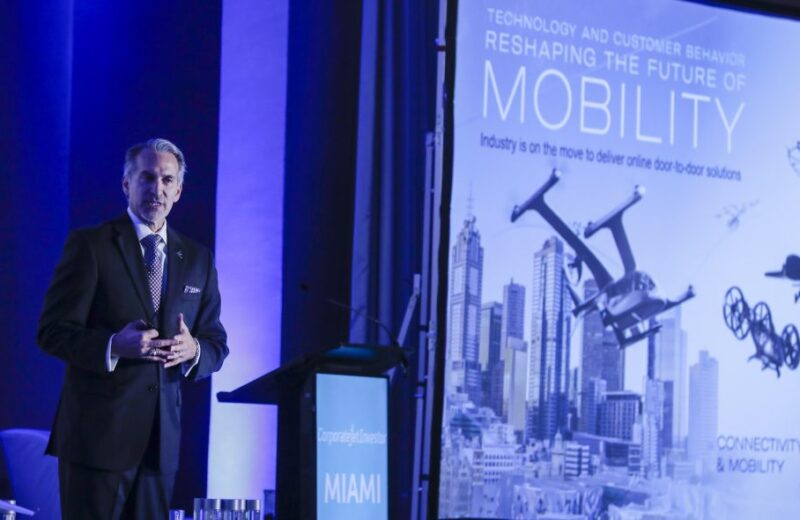Millennials ‘already shaping business aviation’: Embraer’s Michael Amalfitano

Embraer’s Michael Amalfitano says Millennials are already having a big impact on tomorrow’s private jet sector.
Millennials, born between the mid-1980s and 1995, are already shaping private jet aviation; both in the design of private jets and in their choice of employers, according to Michael Amalfitano, President and CEO of Embraer Executive Jets.
While Millennials have yet to become major users of private jets, original-equipment manufacturers (OEMs) are already considering their preferences when designing tomorrow’s business jets and in their recruitment campaigns, Amalfitano told delegates to Corporate Jet Investor’s Miami 2019 conference.
“Millennials are reshaping who we are in this new travel ecosystem,” said Amalfitano. “Millennials think only about being connected and being mobile. They are always ‘on’”.
When it came to planning for the business needs of Millennials, the starting point for Embraer was modifying Maslow’s Hierarchy: the motivational theory of five key human needs. That meant adding two new Millennials’ needs – sustainability and connectivity – to the existing list, comprising: safety, love and belonging, esteem and self-actualisation.
Sustainability and connectivity
For Embraer, those new needs dictated the importance of designing jets that incorporated elements of sustainability and connectivity. “When we talk about sustainability, the first thing you think about is fuel,” said Amalfitano. “But that’s not what Millennials think about. They think about what is the corporate social responsibility of your company. Statistics came out this year that confirm that. They talk about 79% of Millennials focusing on what the corporate loyalty is for sustainability.”
While the move towards the use of Sustainable Alternative Jet Fuel (SAJF) was an important development, a host of other factors also reflected Millennials’ preferences. Those included progressing from power plants dependent on carbon to those that are dependent on electricity and other forms of connectivity that enable sustainable mobility. “Whether that be with electric trains or autonomous vehicles [and vertical and other forms of flight], these are ways in which you are going to have a much more holistic integrated travel solution,” he said.
But the sustainability of tomorrow’s business jets goes far beyond their powerplants. It also includes business-jet interiors. Embraer is currently exploring the use of natural materials – including bamboo and wool – in cabin interiors.
Another project focuses on recycling and upcycling materials retrieved from aircraft graveyards. Reclaimed metals from the arid US south west included: titanium, copper and other metals.
“When you think about the future and the travel ecosystems we are trying to develop, you have to think about how to make the entire system more sustainable. We like to talk about the sustainability of the aircraft and the materials the aircraft is made of. Sustainable materials, in the form of bamboo and wool, and recycled products and upscale products that go into the interior. Then those interiors start to have a bespoke story about sustainability.”
Designing recruitment strategies for Millennials
Designing recruitment strategies that appealed to Millennials was also a priority, for Amalfitano. One-in-three of all American workers is a Millennial, and the group already forms a bigger cohort than the Baby Boomers born between 1946 and 1964.
As competition to hire skilled recruits, many of whom are Millennials, intensifies, this cohort is becoming ever more discriminating about choices of employer. Increasingly Millennials want to work for companies with a strong commitment to corporate social responsibility. “When you are thinking about workforce development and thinking about hiring engineers, the people you need to work for your business, sustainability is going to be a big part of what Millennials and your future workforce is thinking about.”
The challenges faced by OEMs and other business-jet aviation employers was underlined by Gus Faucher, chief economist with PNC Financial Services Group. “The unemployment rate is 3.6% – basically the lowest we have had in 50 years. Pretty much everyone who wants a job can find a job,” said Faucher at the conference. “So, if we haven’t got full employment now, we are very close to it.”
‘Everyone who wants a job can find a job’
Summing up, Amalfitano said: “We want to design a future that allows us to take advantage of sustainable fuels, sustainable interiors, electrification, simplified flight, autonomous. And bring it together for what the expectation is for different business aircraft to have an experience that is deserving of that investment.”
Amalfitano and Faucher were speaking on Tuesday 12th November at our CJI 2019 Miami conference at the Fontainebleau Hotel in Florida’s Miami Beach.
Meanwhile, the CEO of one operator told our sister publication Corporate Jet Investor Quarterly last month: “Our job as an industry is to keep Millennials interested in using business aircraft and make them aspire to using private aircraft.” Luxury fashion brands, such as Chanel, Gucci and Prada, are good at selling small things like bracelets and keyrings to build loyalty, he noted. “We need to do the same thing until they have $30k or hopefully $100k to spend on chartering regularly.”
Last month, Flexjet, the US-based fractional operator, placed a $1.4 billion order with Embraer for a group of of its business jets.
The Generation Game: Who’s who
- Baby boomers: Born between 1946 and 1963
- Generation X, or Gen X: Born between mid-1960s and mid-1980s
- Millennials: Born between mid-1980s and 1995
- Generation Z: Born after 1995.
